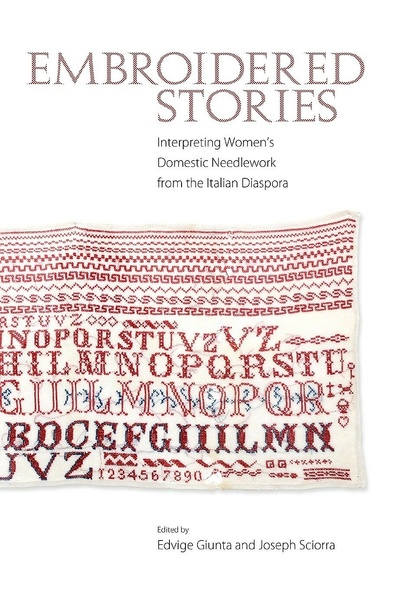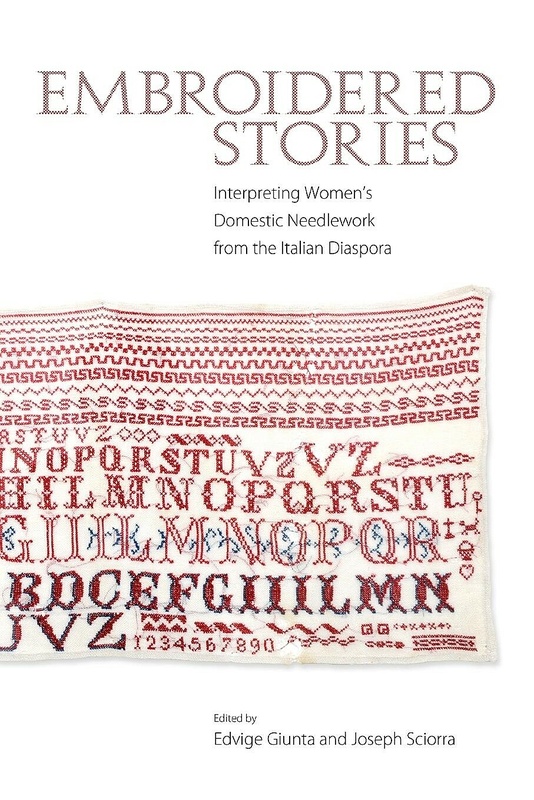
Embroidered Stories
Interpreting Women's Domestic Needlework from the Italian Diaspora
For Italian immigrants and their descendants, needlework represents a marker of identity, a cultural touchstone as powerful as pasta and Neapolitan music. Out of the artifacts of their memory and imagination, Italian immigrants and their descendants used embroidering, sewing, knitting, and crocheting to help define who they were and who they have become. This book is an interdisciplinary collection of creative work by authors of Italian origin and academic essays. The creative works from thirty-seven contributors include memoir, poetry, and visual arts while the collection as a whole explores a multitude of experiences about and approaches to needlework and immigration from a transnational perspective, spanning the late nineteenth century to the late twentieth century.
At the center of the book, over thirty illustrations represent Italian immigrant women’s needlework. The text reveals the many processes by which a simple object, or even the memory of that object, becomes something else through literary, visual, performance, ethnographic, or critical reimagining. While primarily concerned with interpretations of needlework rather than the needlework itself, the editors and contributors to Embroidered Stories remain mindful of its history and its associated cultural values, which Italian immigrants brought with them to the United States, Canada, Australia, and Argentina and passed on to their descendants.
Curated with dedication over more than ten years, this anthology in the end impresses me most with its vitality and creativity, typical of unique intellectual work moored in authentic encounters with the objects of study. Clearly a ‘rewarding and joyful experience,’ the work of the editors and their collaborators encourages similarly innovative scholarship and reflection on the significance of women’s needlework and other crafts among students of the Mediterranean and its diasporas.
Embroidered Stories is a glorious collection of stories by great Italian American writers with a firsthand interest, passion, and knowledge of the art created by our foremothers with a needle and thread. These artisans, the women in our families, created magnificent art on fabric, whether it was a sampler of the alphabet, delicate lace, colorful cutwork, shimmering beadwork, or the detail work on sumptuous gowns and costumes. To this day, somewhere buried deep in an attic trunk or a drawer in a spare bedroom, you will find examples of their artistry. You may find a simple nightgown with an inlaid lace placket, or a wedding gown with delicate seed pearls set in gold leaves sewn by hand—and when you do, you will know the story behind the craft. This collection is a treasure of all that is sacred and dear, the unsung women in our lives who made the world more beautiful with their talents.
Embroidered Stories assembles the evocative words of poets, artists, art historians, historians and folklorists, as they reflect on and analyze needlework’s significance within and beyond the homeland of the Italian diaspora. For, although this art and craft was to some extent lost as second and later generations of immigrant women went on to other endeavors (including work in textile and garment industries), the objects and the narratives surrounding them survived and are being rediscovered. Replete with vivid memories of mothers’ and grandmothers’ skills and aesthetic sensibilities, and illustrated with well-chosen photographs, this book is testimony to the historical weight and richness of Italian women’s needlework.
The editors and writers of Embroidered Stories have approached the most voiceless of objects . . . and have endowed works of this hand, as the book’s title suggests, with the power to testify. No longer mute, the blankets, doilies, towels, handkerchiefs, sweaters, comforters—all such things now bear witness to lives of mute subjection, years of silence hopeless and unbroken.
Edvige Giunta is professor of English at New Jersey City University. She is the author of Writing with an Accent: Contemporary Italian American Women Authors and coeditor of Teaching Italian American Literature, Film, and Popular Culture, Italian American Writers on New Jersey: An Anthology of Poetry and Prose, and The Milk of Almonds: Italian American Women Writers on Food and Culture. Joseph Sciorra is associate director for academic and cultural programs at the John D. Calandra Italian American Institute, Queens College. He is editor of the journal Italian American Review and the book Italian Folk: Vernacular Culture in Italian-American Lives.





